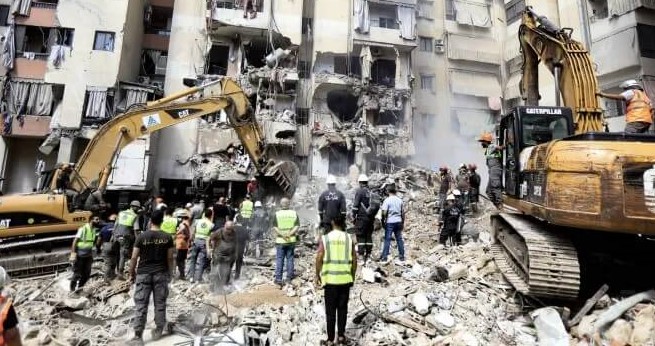Israeli airstrikes kill at least 182, citizens told to evacuate
3 min read
Residents of southern Lebanon receive evacuation calls as Israel shift focus to its northern border
BEIRUT: Israel attacked hundreds of Hezbollah targets on Monday in airstrikes which Lebanese health authorities said killed at least 182 people, making it the deadliest day in Lebanon in nearly a year of conflict with its Iran-backed enemy.
After some of the heaviest cross-border exchanges of fire since the hostilities flared, Israel warned people to evacuate areas where it said the armed movement was storing weapons.
After almost a year of war against Hamas in Gaza on its southern border,F Israel is shifting its focus to its northern frontier, from where Hezbollah has been firing rockets into Israel in support of its ally Hamas.
“The actions will continue until we achieve our goal to return the northern residents safely to their homes,” Israeli Defence Minister Yoav Gallant said in a video published by his office, setting the stage for a long conflict as Hezbollah has vowed to fight on until there is a ceasefire in Gaza.
“These are days in which the Israeli public will have to show composure.”
Israeli military launches fresh strikes on Hezbollah in Lebanon
Gallant was speaking after the Israeli military targeted Hezbollah in Lebanon’s south, eastern Bekaa valley and northern region near Syria in its most widespread strikes.
Lebanon’s health ministry said at least 182 people had been killed, including women, children and medics, and 727 were wounded in Israel’s strikes on Monday.
Israeli army spokesperson Avichay Adraee said on X that more than 300 Hezbollah targets had been struck so far after earlier warning that air strikes were imminent on houses in Lebanon where “Hezbollah hid weapons”.
Reuters could not independently verify Israel’s allegation that Hezbollah had stored weapons in homes and villages.
In response, Israel’s arch foe Hezbollah said it had launched rockets at Israeli military posts.
Another round of attacks was expected. Israeli aircraft are preparing to attack Hezbollah strategic weapons stashed in houses in Lebanon’s Bekaa valley, the Israeli military spokesperson said, calling on civilians to evacuate immediately.
“The sights now from south Lebanon are of secondary explosions of Hezbollah weapons, which are exploding inside houses. In every house we are attacking there are weapons. Rockets, missiles, unmanned aerial vehicles that were meant for and aimed at killing Israeli civilians,” Rear Admiral Daniel Hagari said in a televised statement.
The air strikes have intensified pressure on Hezbollah, which last week suffered an attack its Secretary General Hassan Nasrallah called “unprecedented in the history” of the group, after thousands of pagers and walkie-talkies used by its members exploded.
The operation was widely blamed on Israel, which has not confirmed or denied responsibility.
In another major blow, an Israeli airstrike on Beirut’s southern suburb on Friday targeted senior Hezbollah commanders, killing 45 people, according to the Lebanese health ministry.
Hezbollah said 16 members of the group were among the dead, including senior leader Ibrahim Aqil and another commander, Ahmed Wahbi.
The fighting has raised fears that the United States, Israel’s close ally, and Iran will be sucked into a wider Middle East war.
Iran’s Foreign Ministry spokesperson Nasser Kanaani condemned the Israeli strikes. “There will be dangerous consequences to the new adventure of the Zionists,” he said.
One person was slightly hurt by shrapnel from the latest rocket barrage at northern Israel, according to the Israeli ambulance service.
Imad Kreidieh, the head of Lebanese telecoms company Ogero, told Reuters on Monday that more than 80,000 automated calls asking people to evacuate their areas were detected on the network. Not all were answered.
Lebanon’s Interior Minister Bassam al-Mawlawi opened schools in Beirut, the northern city of Tripoli and in the south as shelters amid “heavy displacement” of citizens, his office said in a statement.
Evacuation calls have been received on phones as far as the Lebanese capital, Beirut.




